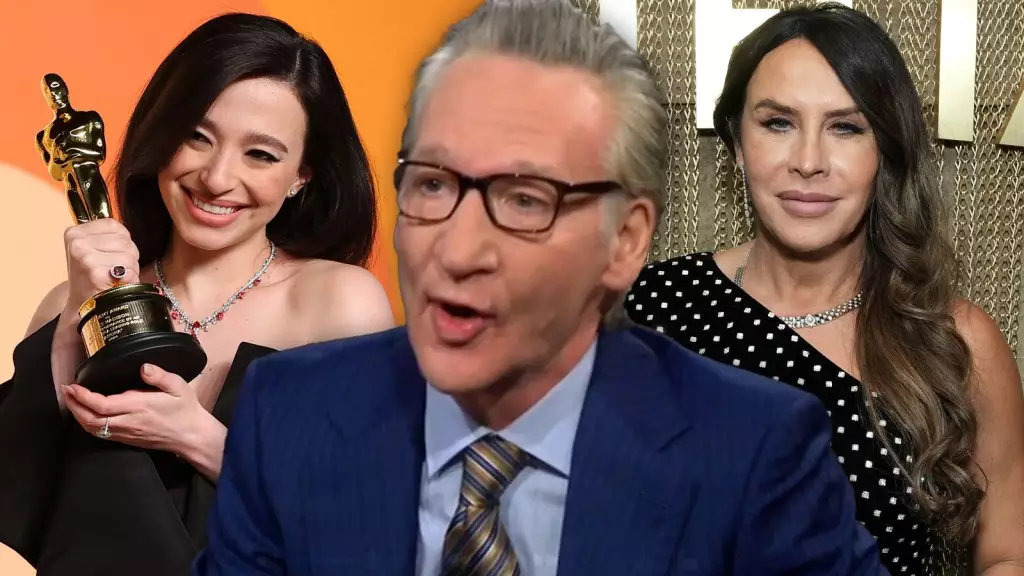The phenomenon of cancel culture has become an indelible part of modern discourse, particularly within the entertainment industry. Bill Maher’s recent remarks on his show, Real Time with Bill Maher, shed light on how this cultural movement not only persists but has also mutated into a more nuanced force. The discussion with David Sedaris highlighted that cancel culture isn’t merely about digital mobs seeking retribution; it has subtly embedded itself into crucial institutions like the Academy Awards. This shift indicates a society grappling with its own moral compass, driven by social accountability but torn by concerns over free expression and authenticity.
Maher put forward a compelling argument that the fallout surrounding nominees such as Karla Sofía Gascón reveals the lasting implications of cancel culture. While some might dismiss it as a temporary fad or argue that it hasn’t real consequences, Maher pointed out the gravity of its intersection with major events like the Oscars. He cited the narrative around Emilia Pérez, a film that many believed could have been a frontrunner, suggesting that controversies can unravel careers overnight. This is not simply a case of losing an award—it’s about how public perception can twist the fates of artists without them ever stepping into the ring to defend themselves.
Public Accountability or Hyper-Sensitivity?
The cancellation of individuals has drawn a diverse array of opinions from both sides of the cultural divide. Critics perceive it as an overreaction to comments that may not warrant such scrutiny, while proponents argue it’s a necessary measure to hold individuals accountable, especially those who wield significant influence. Maher provides an inconspicuous yet astute observation—sometimes, the truth can be blunt, honest, and childlike, yet still somehow fall short of public approval.
Take, for instance, Gascón’s social media activity that has been scrutinized for its insensitivity. Maher likened her tweets to “childish” outbursts, raising an important question: where should one draw the line between candid expression and social sensitivity? Such a paradox represents the core of ongoing discussions around cancel culture. The public’s reaction can often feel disproportionate, as seen in Gascón’s case, where re-emerging statements resulted in a media firestorm that might seem excessive to some.
Delving deeper, this scenario signals a cultural dilemma: are we choosing sincere authenticity over a sanitized public persona, or are we simply trading one form of hypocrisy for another? The backlash against Gascón underscores an ironic twist; those who advocate for marginalized voices can also become their worst critics, sometimes translating necessary accountability into unforgiving animosity.
The Irony of the “Woke” Community
The irony doesn’t stop at judgment from the public; it extends to the very community that brandishes the “woke” banner. As Maher articulated, many in the so-called woke community often engage in a form of cultural gatekeeping that winds up silencing the very voices they aspire to elevate. Gascón’s emotional apology encapsulated a common phenomenon—those striving to break barriers can easily become victims of the unforgiving scrutiny they themselves advocate against.
The case of Gascón serves to highlight an uncomfortable truth: the sheer power of social platforms can amplify voices while simultaneously dictating their decline. It’s as if the digital town square has evolved into a gladiatorial arena—the stakes are high, public opinion swings like a pendulum, and the narrative can flip with startling speed. In this climate, one must navigate a labyrinth where authenticity and accountability are often at odds, cleverly hidden beneath layers of complex social issues.
Lessons from the Oscars
The 2023 Oscars represented far more than artistic recognition—it served as a microcosm of a society struggling with its values. Anora’s triumph over the potentially groundbreaking Emilia Pérez encapsulated the paradox of progress in the arts. While Gascón’s missteps may have caused her downfall, it simultaneously elevated Anora, pushing forward a narrative that goes beyond just winning an award. It’s a poignant reminder that in the ever-evolving theater of cancel culture, the balance of accountability and artistic expression remains precarious.
As we witness the landscape of media and public opinion continuously shift, it becomes increasingly clear that dialogue is key. Maher’s insights remind us that while cancel culture may appear resilient, honesty and transparency can diminish its power. The trick lies in distinguishing genuine accountability from mere societal bullying—a divide that demands a more compassionate and thoughtful public discourse. After all, in an age where social media rivets public consciousness, it is essential that we forge a path toward understanding, rather than division.


Leave a Reply